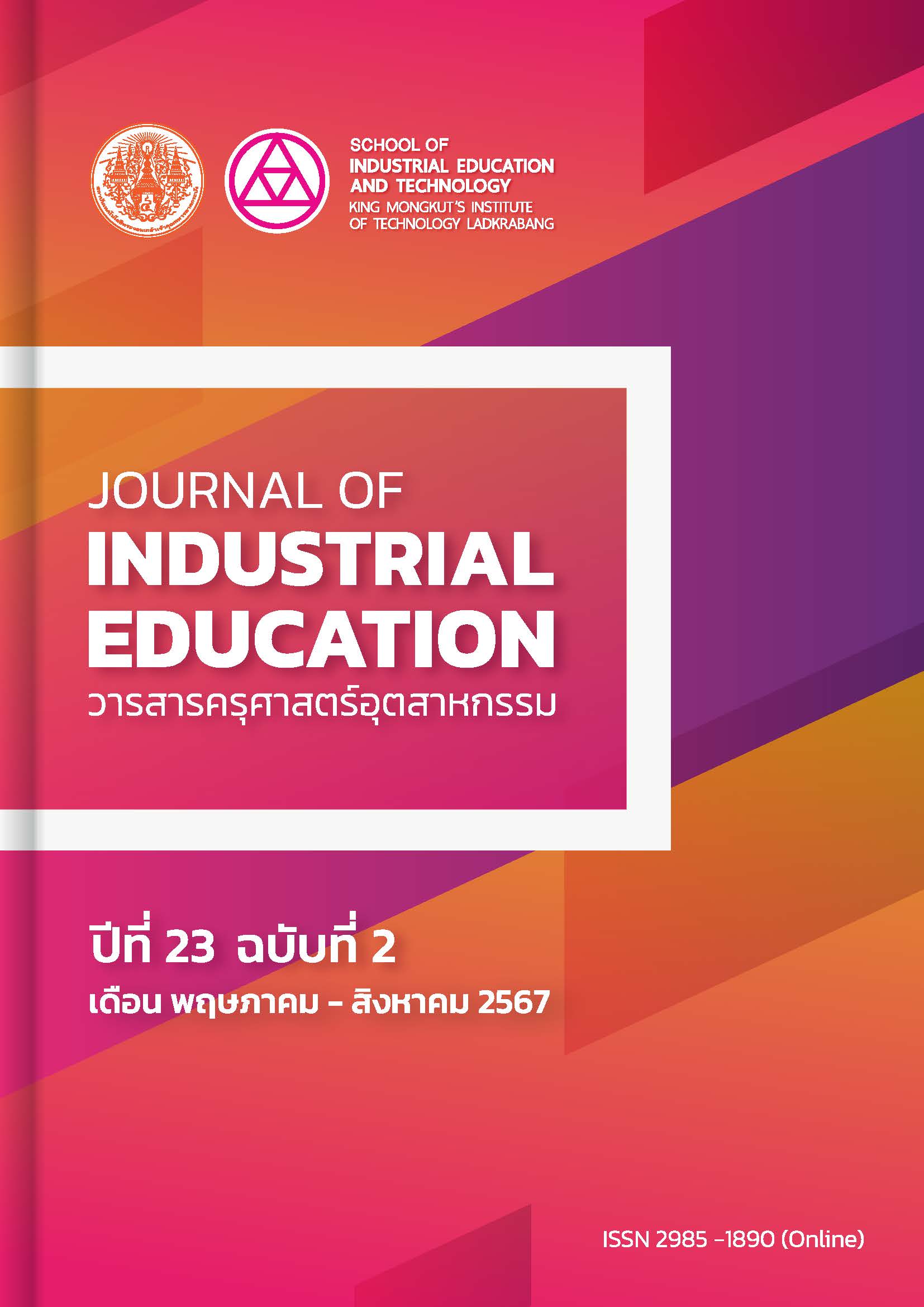EXPERIMENTAL LABORATORY SET VIA INTERNET SYSTEM ON ELECTRICAL INSTRUMENT AND MEASUREMENT COURSE OF HIGHER VOCATIONAL CERTIFICATE PROGRAM OF RAJAMANGALA UNIVERSITY OF TECHNOLOGY ISAN, SAKON NAKHON CAMPUS
DOI:
https://doi.org/10.55003/JIE.23211Keywords:
Experimental operations, Electrical measurement tools course, InternetAbstract
Development qualities, efficiency, and user satisfaction of the experimental laboratory set via internet system are electrical instrument and measurement course of the Higher Vocational Certificate Program of the Rajamangala University of Technology Isan, Sakon Nakhon campus. The research sample group consists of 21 first-year students in the Electronics Engineering Department, Higher Vocational Certificate Program, Rajamangala University of Technology Isan, Sakon Nakhon campus, and the choose a specific type. The research tools were the experimental laboratory set via internet system on electronic measurement tools course of Higher Vocational Certificate Program of Rajamangala University of Technology Isan, Sakon Nakhon campus., content and media production technical quality evaluation forms, academic achievement test and practice evaluation form, and user satisfaction evaluation form. Statistics used in this research were mathematical mean (𝑥̅), standard deviation (SD), and percentage. The research results found that the experimental laboratory set via the internet system on electronic measurement tools course of Higher Vocational Certificate Program of Rajamangala University of Technology Isan, Sakon Nakhon campus have the content quality was good level ( = 3.96, SD = 0.79) and the media production technical quality was good level (
= 4.20, SD = 0.66). The efficiency meets the established criteria, with the entire research population surpassing the threshold of 80/80 points for E1/E2. The average scores are 92.65 and 87.40 respectively. User satisfaction with this experimental laboratory set via the internet system was the highest level (
= 4.78, SD = 0.44).
References
Brahmawong, C. (2013). Developmental testing of media and instructional package. Silpakorn Educational Research Journal, 5(1), 7-20. (in Thai)
Chamnian, M., & Chamnian, K. (2018). Benefit, problems and solutions of using online media in studies with efficiency in schools, Nakhon Si Thammarat Province. Ratchaphruek Journal, 16(3), 113-121. in Thai)
Khan, S., Ahmed, R. R., Streimikiene, D., Streimikis, J., & Jatoi, M. A. (2022). The competency-based training & assessment, and improvement of technical competencies and changes in pedagogical behavior. E&M Economics and Management, 25(1), 96–112.
Manoharan, K., Dissanayake, P., Pathirana, C., Deegahawature, D., & Silva, R. (2023). A competency-based training guide model for labourers in construction. International Journal of Construction Management, 23(8), 1323-1333.
Meethongjan, K., & Tachpetpaiboon, N. (2015). Competency-based training to develop basic computer skills for the elderly: A case study of the Dusit community, Bangkok, Thailand. Procedia-Social and Behavioral Sciences, 197, 2520-2525.
Mor, D., Laks, H., & Hershkovitz, A. (2016). Computer skills training and readiness to work with computers. Interdisciplinary Journal of e-Skills and Lifelong Learning, 12, 095-112.
Pakdeejun, S., Maunsaiyat, S., & Sunthonkanokpong, W. (2023). the effectiveness of online course 'the Operating Amplifier and Filter Circuit, OP-AMP and Linear IC,' Journal of Industrial Education, 22(2), 98-106. (in Thai)
Rapuano, S., & Zoino, F. (2006). A learning management system including laboratory experiments on measurement instrumentation. IEEE Transactions on Instrumentation and Measurement, 55(5), 1757-1766.
Chwaninger, A. (2011). Computer based training: advantages and considerations. Aviation Security International, 17, 18-23.
Schwaninger, A. (2011). Computer based training: Advantages and considerations. Aviation Security International, 17, 18-23.
Downloads
Published
How to Cite
Issue
Section
License
Copyright (c) 2024 Journal of Industrial Education

This work is licensed under a Creative Commons Attribution-NonCommercial-NoDerivatives 4.0 International License.
"The opinions and contents including the words in papers are responsibility by the authors."
"ข้อคิดเห็น เนื้อหา รวมทั้งการใช้ภาษาในบทความถือเป็นความรับผิดชอบของผู้เขียน"



